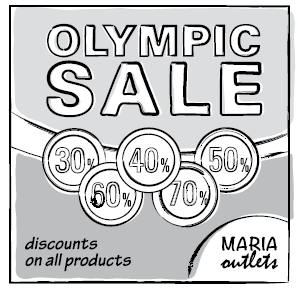
Late last month, the United States Olympic Committee (the “USOC”) sent a few not so nice warning letters to brands that sponsor athletes, but chose not to pay the “golden” price of becoming an “official” sponsor of the games. The USOC warned these brands about the high potential for intellectual property infringement as Olympic fever (not Zika) starts to catch on in Rio.
Athletes, coaches, trainers and officials (as well as the brands that sponsor them by implication) are all subject to Rule 40 of the Olympic Charter that prohibits unsanctioned participation in advertising during the games and for a period before and after. Practically speaking, this means that no one other than official sponsors has permission to use athletes’ names, photos or performances for advertising purposes during the blackout period and violators can be sanctioned by the International Olympic Committee (the “IOC”). Under the rule, unofficial sponsors can’t even congratulate their athletes for winning gold medals on Twitter during the games and athletes can’t thank their sponsors in a tweet either. This has sparked a lot of controversy amongst brands and athletes, leading to a social media movement pushing for change #Rule40. This year, the IOC relaxed the rules slightly for non-official sponsors, but if you didn’t make any submission of your planned advertising earlier this year, the new rules won’t help you.
Because social media posts are a lot like the 100-meter dash – Things go very fast, but it takes a lot of training to run the race and win, we here at The TMCA put together a “cheat sheet” for the Road to Rio:
The USOC owns 199 U.S. trademark registrations and they aren’t afraid to use them. Think twice before using any of the following in social media posts from your brand’s account: ROAD TO RIO, GOING FOR THE GOLD, TEAM USA, GO FOR THE GOLD, OLYMPIC SPIRIT, OLYMPIC BEAT, OLYMPICS, FUTURE OLYMPIAN, TOGETHER WE WIN and LET THE GAMES BEGIN. Official sponsors pay for the privilege to use these trademarks under license, and if you are not an official sponsor, you must be careful about your use of these marks in advertising. While some uses of trademarked terms are legally permissible under the doctrine of fair use (like our use of Road to Rio in this post), anything that suggests an official connection or sponsorship with the Olympics might get you banned from future games or worse.
Stay away from anything else that suggests authorization, sponsorship or an official connection to the Olympics. This includes using the famous Olympic rings, the official Rio Logo, the official mascot or hashtags incorporating trademarked terms in connection with commercial promotions. Also be careful about using the word “official.” Here’s an example from the IOC’s Brand Protection Guidelines for the Advertising Market and Advertisers that shows an improper use of the Olympic rings:

But people all over the web are posting about #Rio2016 and #TeamUSA – Why can’t our brand do the same? Remember that individuals who post on their own personal social media pages have much more latitude than advertisers when it comes to use of trademarks and copyrighted material.
Always root for Team USA, but don’t congratulate your favorite athletes in social media posts from your brand’s account or in advertising. As we reminded you in connection with promotions for the Big Game in January, last year, a jury awarded Michael Jordan $8.9 million after a grocery store took out an ad congratulating him for his induction into the Basketball Hall of Fame. Prior to the jury verdict, the case went up to the Seventh Circuit and the court held that the ad qualifies as commercial speech, defeating the defendant’s First Amendment defense.
So you might be asking yourself, is there anything my brand can do during the Olympics or should we just go to the beach for two weeks and quietly watch highlights in the evening?
As we have all seen, innovative brands are often able to join the conversation on social media during large sporting events or awards shows without paying the price for sponsorship. While the IOC explicitly prohibits “ambush marketing,” it defines these tactics as “characterised by any intentional or unintentional attempt to create a false, unauthorized commercial association with a brand or event, in this case Rio 2016 and the Olympic and Paralympic Movements.” But effective ambush or guerrilla marketing can be subtle, effective and not cause concern for the event’s sponsor. Here is one of our favorites: